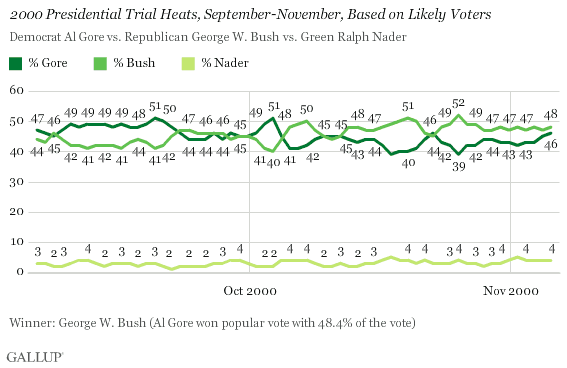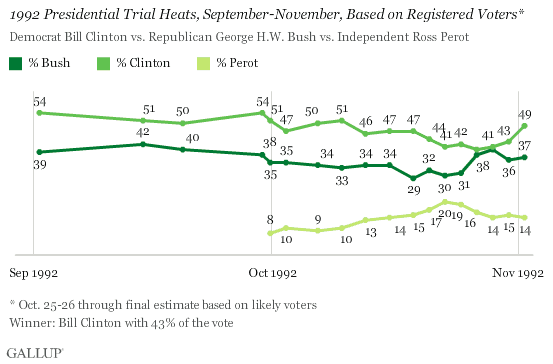Let’s be clear: if history is a reliable guide, this presidential race was going to finish closer than the polling last Friday indicated – even without the latest Clinton-Comey email imbroglio. Indeed, there was evidence that the race was already tightening before Comey’s letter telling congressional leaders a new batch of emails that were potentially pertinent to the Clinton email investigation had been discovered. The reason is, as Robert Erikson and Chris Wlezien explain in their exhaustive study of presidential polling, as campaigns wind down to Election Day, partisan identification becomes an increasingly important predictor of the vote. This means that voters who may have told pollsters earlier in the campaign that they were considering voting for the other party’s candidate eventually come home to support their own party’s nominee. It is not surprising, then, that in the two weeks prior to the leaking of Comey’s letter last Friday, Clinton’s lead in the RealClearPolling aggregate had dropped by almost 3%. Moreover, as I have been telling my election audiences, the race would have tightened more quickly had Trump been able to get out of his own way in order to focus his message on the fundamentals – the economy and terrorism – that are of greatest concern to voters. Instead, he managed (to Clinton’s relief and not without her help) to focus attention on a series of news stories, from his missing tax returns to Alicia Machado to the 2005 audio tape and allegations of sexual harassment (and worse), that collectively steered the campaign coverage toward exactly the wrong issues from his perspective. In this vein, it is worth recalling that almost all the political scientist election forecast models predicted that this would be a tight race – in the aggregate (which is how I make my quadrennial forecast) the forecast models have Clinton winning the two-party popular vote by about 1%. (This is probably a good time to remind readers that if you want to know who is going to win the election Drew Linzer’s site is probably the gold standard. However, if you want to know WHY the candidate won, you need to consult the political scientist forecasts models.)

So will this latest email controversy make a lasting difference? Many journalists think it will. Thus, WCAX’s superb Eva McKend, citing our earlier conversation in which I expressed skepticism that any “October Surprise” would affect this election, chided me in this tweet: “@MattDickinson44 how about this for an October surprise? Sorry Matt, I think you were wrong on this one. It’s definitely real.” Eva is right that the Comey story will likely affect the polls, at least in the short run. But I suspect it won’t affect the overall trajectory of this race nearly as much as Clinton’s supporters fear and her critics hope. As I told Eva, so-called October surprises rarely have a lasting impact on the presidential race unless they occur in the last few days of the campaign. One example of an October surprise that might have mattered is the 2000 story, released four days before the presidential election, of George W. Bush’s conviction for drunk driving more than two decades earlier. In his memoirs, Karl Rove laments that the announcement cost Bush about 2% of the popular vote and perhaps 30 Electoral College votes – enough to win the election without Florida. Because it occurred so late in the campaign, the Bush team didn’t have much time to go on the offensive and bring the campaign narrative back to the themes that had, until that point, put him in the polling lead.

Another potential example is Special Prosecutor Lawrence Walsh’s decision to announce Caspar Weinberger’s indictment on October 30 for Weinberger’s actions regarding the Iran-contra affair – an indictment that cast doubt on President Bush’s claim that he was not involved in the decisionmaking that led President Reagan to swap arms for hostages. Bush supporters contend that news story blunted the last minute momentum that had nearly pulled him into a tie with Clinton.

However, both these incidents took place within 4-5 days of Election Day. That’s not the case with the Comey announcement last Friday, which occurred with 11 days to go before final voting. Already Clinton surrogates, like John Podesta and Tim Kaine, are taking to the airwaves to turn Comey’s behavior and motivation, and not the investigation into the emails itself, into the main story. And Clinton is attacking Comey head on during her stump speeches, calling his actions highly unusual. Not surprisingly, my twitter feed has seen a dramatic reversal, with Clinton supporters now casting aspersions on Comey’s professionalism, whereas a week ago they were praising his decision not to pursue criminal charges against their candidate, while Trump’s backers now see him as the paragon of integrity – a stark reversal from their views prior to last Friday. No one ever accused the partisan denizens on social media of consistency!
Note that this is exactly the tactic Clinton and her surrogates have been using to beat back the steady drip, drip, and drip of the Wikileaks stories, which in my view are potentially far more damaging to her presidential ambitions, with the window they provide into the Clinton Foundation fundraising for Bill Clinton and private concerns expressed by Podesta and others over the security of her email server. To date, however, the Clinton campaign has managed to make the WikiLeaks story as much about Russian meddling in the U.S. election, and stolen emails, as it is a window into possible Clinton corruption. In this they have been aided by Trump’s apparent inability to stay on message, thus inadvertently helping Clinton refocus media attention away from the potentially damaging leaks.
In short, I believe that there is enough time for the latest Comey email issue to be fully debated and digested in a way that won’t dramatically change the trajectory of this race, which was already tightening. At most, it will move the race toward the equilibrium it was already trending toward, which was a closer contest than what we saw last Friday. To be clear, if forced to guess, I suspect these emails won’t do a whit to change Comey’s original finding that there was no criminal intent on Clinton’s part – only negligence – when it came to handling classified material. But at this point the substance of the emails hardly matters, since Comey’s agents can’t possible complete a review of what is reported to be thousands of documents in 11 days. And that vacuum will certainly allow pundits and talking heads to do what they do best: engage in uninformed speculation designed to drive ratings. Already we see that with cable discussion about what the emails might say, or whether Clinton’s associates might have obstructed justice – all in the absence of any information on either point. Conceivably, of course, the wild cable chatter might influence some of the early voting going on now. At the same time, however, the lack of substance allows Clinton’s team to change the conversation into a discussion about Comey meddling in an election. Moreover, the media cycle is such that this story is likely to recede into the background noise by Election Day in a way that allows the outcome to turn on the fundamentals that typically drive most presidential elections. That assumes, of course, that there’s not another October Surprise in the interim – and that Trump can avoid stepping on his own campaign message. So far, the latter has proved to be a very unrealistic assumption.
Does the Comey story help Trump? Undoubtedly, at least in the short run. Will it change the outcome of this race? I suspect not.

As you say, there are many discussions speculating about things we don’t know. Also annoying are the assertions that contradict the little that we do know. For instance, the repeated assertions that Comey would not have made this announcement unless he had particularly damning evidence of wrongdoing. According to his memo to FBI employees, all Comey has done is authorize his investigators to seek access to the emails. In other words, since the evidence came from an unrelated investigation, they still needed a separate subpoena just to look at them. He also said overtly that he does not know if they are significant. (We don’t even know that they are “new.” Unless Huma Abedin was in the habit of emailing to herself, they probably exist elsewhere as well.) Yet the assertions continue. I assume this sort of thing is part of the reason that the Justice Department usually avoids acting right before an election.
All good points and worth repeating: Comey does not know what is in the emails, and the fact that he sent the letter to Congress says nothing about what might be in them. In my view, Comey’s bigger error was the original press conference he held to both exonerate and excoriate Clinton’s handling of her emails and server. There was no reason to go public with his recommendation to Justice, but once he did he attracted the ire of Republicans in Congress, who held his feet to the fire in public testimony. Once he became publicly embroiled in the controversy, it made it extremely unlikely that he would not notify Republicans (and Democrats) when this new information was relayed to him, for the sake of appearing nonpartisan. Former FBI agents tell me Comey’s original press conference violated agency protocol.
The part that scares most of us who are not Americans is a campaign by Mr. Trump based on “anti” almost everything particularly foreigners and trade deals. His belief that all trade deals have been bad for America are simply nonsense based on zero facts. And we fear for a loss by him. Where will all these angry people go for a solution to their problems which no government will be able to solve to their satisfaction.